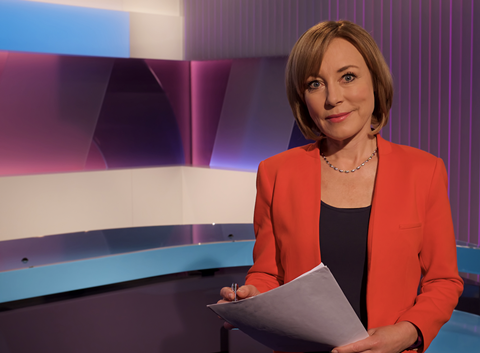Comment: 5 News presenter Sian Williams provides advice on dealing with tough times

Those who work in broadcasting are a resilient bunch – we have to be.
Whether you’re a producer back in the edit because a commissioner suddenly changes their mind; or an indie pitching for a show only to be told there’s no money; or a freelance journalist wondering whether you’re going to get another shift, we have to be flexible to ride with the demands and vagaries of the business and keep our heads above water. And we have to try not to go bonkers in the process.
Usually, a sense of purpose and meaning acts as a protective mechanism when the churn and chaos gets too much. Recently though, it’s felt overwhelming. This month, I mark 35 years working in daily news and in all that time, no story has affected our lives and livelihoods quite as much as the one we’re living through now.
Whatever your circumstances, they’re seen through the prism of coronavirus. Whereas before we may have been able to distance ourselves from work when needed, now the personal is inextricably enmeshed in the professional – day in, day out.
During lockdown, I’ve been delivering psychological therapy to university students, families with complex trauma and NHS patients, and what I’ve noticed with them is something I’ve also seen amongst my colleagues.
The hyper-vigilance that comes with the huge uncertainty and lack of control is tapping into the primal fear centre in our brain, the amygdalae. It keeps us on a high state of alert, ever-watchful for the next threat. It can feel exhausting.
It is possible to build resilience and growth during traumatic and challenging times, though. Those conducting research after the terrorist attacks of 9/11 were struck by the level of resilience shown among New Yorkers. A term was coined by clinical psychologist George Bonnano to reflect it: coping ugly.
Surviving and thriving after something like that was brutal, but those that lived through it, developed tools and techniques which strengthened and supported them.
A few years ago, I conducted my own research with employees in six different UK media organisations, all of whom had experienced a work-related trauma.
Many had developed something called ‘post-traumatic growth’, in other words, the experience had shifted their perspective on what gave their lives meaning. I asked them what advice they would give others, including their bosses, to help us develop resilience in a time of crisis.
Here’s what they said:
- Reflect on what’s happening with others who understand (often your peers). This sense of closeness and common identity helps develop compassion, towards yourself and your colleagues.
- Know where your support is, and reach out for it. It is never a weakness to ask for help.
- Control what you can and give your day structure with pockets of calm. Use whatever roots you in the present; nature, good food, a moment to breathe more slowly.
- Step away from work temporarily if it gets too much. Ask for time off. If that’s not possible, create clear boundaries.
I would add:
- It’s normal to be anxious. Accept vulnerability but notice when thoughts become catastrophizing. Don’t fill your brain with ‘what ifs?’. Stay in the here and now.
- Speak to yourself as you would to a friend. If your self-critical voice isn’t helpful, invite it to leave for now.
- Be willing to adapt. You’ve already learnt you can handle difficulties. You may also understand the things that nourish and deplete you, in a way that you wouldn’t before lockdown. Use that going forward.
Now, you can tell me this is touchy-feely nonsense, and when I started in psychology 10 years ago, my journalist colleagues often did. In that decade I’ve done the science, I’ve seen the empirical evidence and I’ve written the book on recovery after adversity. It is possible. It takes work, it’s back-and-forth, you may relapse and stumble, but it’s do-able.

I’m tempted to say don’t look at screens before bedtime. Eat well. Get some exercise. Try mindfulness. Avoid drugs and alcohol.
But you know all that already. What you may not have been told is the harsh fact that none of us is indispensable at work. You are, however, pretty important to your family.
Know what and who, to protect. Start with you. It’s true what they say about the oxygen mask. Put yours on first. It’s not selfish, it’s survival. Good luck and see you on the other side.
Sian Williams is the presenter of 5 News at 5






